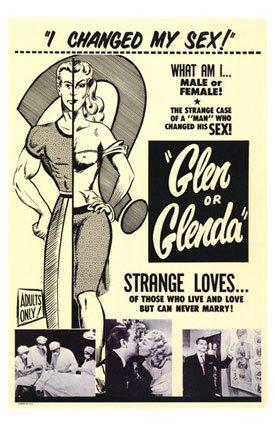My current fascination with Ed Wood is, strangely, related to waking up too early. I’ve tried for years to calibrate my schedule to more like a normal one—I’ve always been an early riser—but have had difficulty doing so. Weekends at home, therefore, include afternoons when I’m always too sleepy to read, so I watch free movies. I’d heard about Plan 9 from Outer Space for years before I finally watched it, and it was an epiphany. Ed Wood, the hapless director, became posthumously famous for his poorly made films, and I’ve been catching as many of those as I can. While Glen or Glenda wasn’t Wood’s first film, it is the one that kicked off his notoriety. Considering that it was made in 1953 it is also way ahead of its time. It is very cheaply made and contains what would eventually become many Wood hallmarks.

Ed Wood was a heterosexual transvestite. Even today, some seventy years later, this is a category that often confuses hoi polloi. That’s largely because sex and gender are often misunderstood as the same thing. Gender is a societally ascribed role—men do this, women do that—based on often unconsidered stereotypes. Today men dressing as women and vice versa is often played for laughs, or, if serious, is mistaken as an indicative sign of homosexuality. Glen or Glenda is sometimes classified as a docudrama that attempts to explain this distinction. Wood, who also stars in the movie, was an actual transvestite, something that wasn’t accepted in the button-down fifties. After all, one command in the Bible prohibits cross-dressing (likely confusing it with assumed sexual behavior).
None of this makes Glen or Glenda a great movie. Way ahead of its time, yes, but a strange mix of things nevertheless. Star billing goes to Bela Lugosi, washed up by this point in his life. His role as a scientist—often presented as “God”—is unclear. The devil also appears in the movie, as do several vignettes, reportedly added by the producer, to make this more an exploitation film. What comes through clearly is that this was a deeply personal film for Wood. He was trying, as directors and authors often do, to explain himself to the world. The most successful tend to do this with panache and style, and, let’s be honest, big budgets. Hollywood, like the publishing industry, is unkind to those who don’t come with well-lined pockets. It doesn’t mean that the rest of us don’t have stories to tell. Ed Wood persisted in telling his and, as Glen or Glenda shows, being way ahead of the curve.
